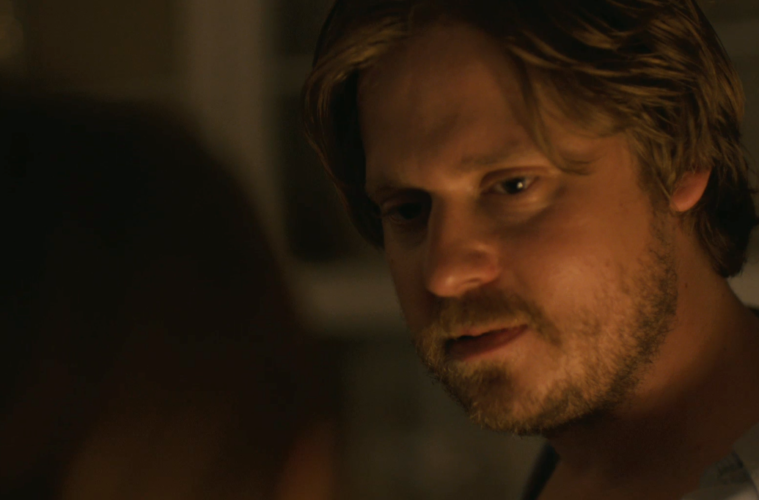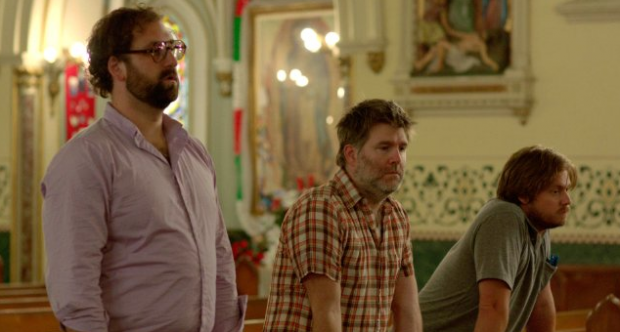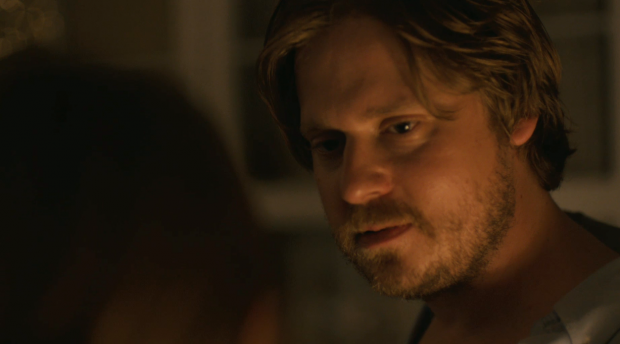
I was nervous about this one. Being a fan of Tim Heidecker‘s comedic stylings already created some entry-level intimidation — never meet those you admire, etc. — but, going into this, I had no clue as to how he’d interact during our talk. Would the guy only tell jokes? I’ve almost never seen him talk outside that realm, so it was just as possible he, when discussing a serious drama, would end up being a brick wall.
It turns out Heidecker, in addition to being a gentleman, had a lot to say about The Comedy, why he wanted to do it, and just how the thing was pulled off. Like his director, Rick Alverson, there’s an evident passion for what’s been accomplished here — even if the star had some personal hesitations before coming aboard. Thankfully, that’s only the start of it.
Our full discussion can be read below:
I just spoke to Rick, who he told me that, upon approaching you for the film, there was trepidation about “recontextualizing” your brand of humor for this film. Could you talk about some of your own concerns?
Considering that both Eric [Wareheim] and I were in the movie together, I thought one potential pitfall would be that people would not be able to see this outside of the work that Eric and I do, and go in thinking it’s a Tim & Eric movie. That was a concern of mine, and it kind of went away as soon as, first of all, I saw the movie — and, second of all, when I saw the screening at Sundance. People just didn’t get hung up on that, for the most part, and it worked.
I think people are able to separate. Just the way that if you go see a movie with Robin Williams in it, and then you go see another one, you can figure out that it’s a different character. [Laughs] I think our audience, in general, is pretty open-minded and interested in thinking outside of just comedy; can kind of appreciate that we’re also just artists in our own way and are interested in all kinds of different stuff.
So, is this something you wouldn’t be able to do if Awesome Show and Billion Dollar Movie weren’t done?
You know, the timing was right. Luckily, it didn’t take much time from us; I was only there for three weeks, I think Eric was only there a week. But, yeah, we weren’t in production — so that it made it possible — and we were kind of excited about doing something outside of what we do.
But with those either in the can or, even, premiering at the same time, was it easier on a creative level to separate yourselves?
I guess so. Yeah, I don’t know; I can’t compare it to a scenario in which that wasn’t the case. [Laughs]
You have several scenes with Eric, but when you’re on your own or with other co-stars — all while being guided by someone who you’d never collaborated with — did your working relationship with him change at all?
Not really. I think we were both on the same page with the director, and we came into it like everybody else did — with sort of an open mind, and just kind of relaxed about it. I think once we got through a couple of days — or we got through the first day; or, even, the first half of the day — we realized that Rick was very confident and in control of what he wanted. He wasn’t a mess, and it was a responsible shoot. It was fun, and we were all getting along; it just became a pleasant experience.
Speaking of being in control and having everything together, I know a lot of this film was actually improvised. During production, were there ever points where you thought things were being taken too far? Maybe a point where Rick told you to scale it back a bit?
No. First of all, he wanted me to go as far as I could; second of all, we both knew that it was going to be all chopped up in the editing room. And, also, there’s just nothing that I could imagine saying, in terms of language, that is going to be — you know, it’s all about the context of the way it’s been said and who it’s been said to — but, for us, it’s all just words. They’re delivered in almost the voice of a character or, sort of, in an ironic way.
You can’t really say anything that’s offensive anymore, unless you really mean it, and you’re really looking someone in the eye and saying, “I really think you’re a fucking piece of shit,” or whatever. That’s never really where this character’s at. He’s either doing a voice or joking around, and sometimes it’s not nice, but it’s not like… it’s nothing that upset anybody on set, you know?
If you talk to the crew, they were probably all snickering. [Laughs] You know, I think there might have been a couple of moments at the bar, with the black guys, that was, like, everybody kind of was holding their breath. It was sort of dancing around these taboos. But, in time, we all realized that it’s a movie — that we’re not playing, we’re acting. That we’re intentionally going down these roads.
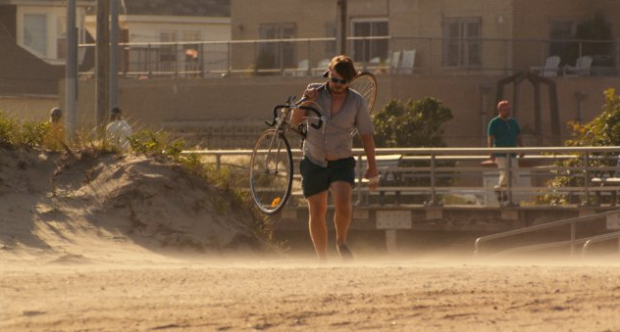
There are scenes here that caused me to laugh so hard that my face began to hurt. One is your Nick Nolte impersonation which, seconds later, is followed by the girl having a seizure; it made me go from fits of laughter to being extremely upset. Did you have to find a different creative place, as an actor, to play both for laughs and that ensuing moment of shock?
You know, honestly, that’s really a product of the editing room. There’s a lot more of the flirting and joking around and the Nick Nolte stuff; that’s sort of taken as one chunk, and the seizure stuff was taken as a separate chunk. I have a tremendous respect for actors that work in a different way, but, for me, I understood that Rick had a very clear idea of what he wanted. As a filmmaker, I understand that, sometimes, choices have to be very technical and not get into, like, a backstory of a character messy kind of thing.
It’s just, like, “I need you to just be dead, and just zone out — and that’s what I need you to be doing in this scene.” So it’s almost not important what I’m doing as an actor; I mean, it is, but it’s about the way that Rick uses the takes and the way he edits them. I’m just trying to give him as much raw material as possible and leave options.
Before shooting a scene, was there consulting with co-stars about what you’d do, or was it on-the-fly for everybody?
I think, you know, we took the opportunity — the time when the blocking and setting-up of scenes were going — to kind of talk about it a little bit. There were some phone calls, meetings, and talks about general, overall things. But we would, generally, just sort of get into something and let the cameras roll, and if something was working, Rick would kind of let it go. If it wasn’t, he’d come in and we’d talk about it — but, a lot of the time, it was just kind of working.
Improv, especially on camera, is something that I think you really need to warm up into. We were given this ability in the way Rick was covering the movie — with long master shots, not a lot of coverage, cameras far back so there was a nice sense of depth — which allowed Gregg [Turkington] and I, in the lunch scene, to just talk for fifteen minutes.
If you go back and look at footage of the first five minutes of that, it’s probably like, terrible, embarrassing, because we’re both looking at each other, just going, “This is so phony. Sitting here, cameras rolling, trying to act like we are just having lunch.” [Laughs] But, you know, you keep going and then you find a little rhythm, follow that down the road, and get the job done.
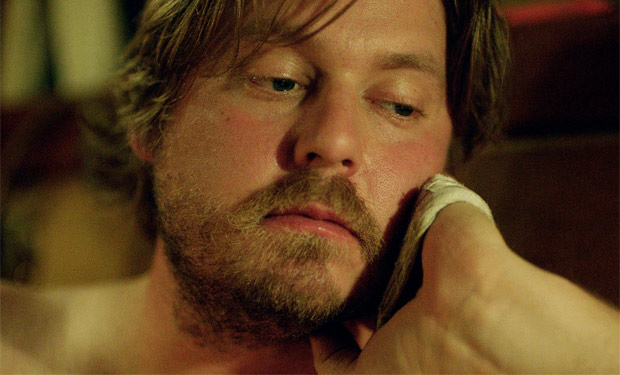
Gregg, obviously, is someone you’ve worked with multiple times, but I was really surprised upon reading that James Murphy would be in this movie. With someone like him — who has a different background, that being music — was it more difficult to prepare, as opposed to Gregg or Eric?
No, it was fine. I think James, in the movie, kind of lays back a little bit; at least, he kind of plays the quieter guy. I’m sure, on his part, it was a move to be like, “I’m going to try to stay out of the way and leave the improv to these guys.” But we were all just on the same page as to what the tone of the movie was going to be, I think. It’s tough, because when you are on the same page with somebody, it’s almost like you don’t need to talk about it — but you feel like you should, because that’s what is right. [Laughs]
But then you kind of end up just going, “Yeah, I know, I know. Yeah, I get it. Let’s do it. Let’s just do it.” So there was just a lot of that amongst us all. And, you know, James lives in that neighborhood — he lives in Williamsburg — and, like, just gets it. Rick didn’t have to tell him much; he just was able to jump into it. I think it’s just a subject that’s probably on his mind a lot.
How did the setting influence your creative process, then? Did it change things in any unexpected way?
I mean, if you talk to Rick and the producers, it makes it very challenging. To shoot a movie in New York is very difficult, but there’s also a tremendous amount of production value that you get out of just having that in the background. The ability to make a movie that’s kind of about New York — and, certainly, part of it is about New York — it’s just kind of a good thing to be able to do.
I used to live there, and I lived in in Williamsburg from, like, 1999-2003, so I saw what he was trying to do. I understood it. I had some connection to it, so it was not, like, a foreign thing to me.
Furthermore with the actors who were “in on it” — such as those in the church or the cab driver — was there ever any hesitation about going far with them?
No, because I didn’t stay in character when we were shooting. I would be myself, they would say cut, and I would say “that was great,” or “thank you very much.” There wasn’t a sense of we were fooling anybody, and they were all actors; there wasn’t any kind of awkwardness at all.
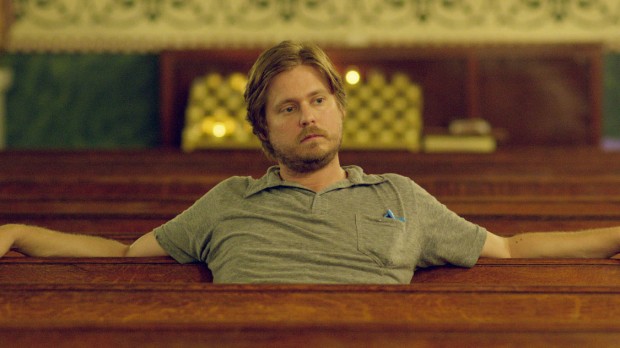
It is fascinating, though, to look at some of the scenes and think about that. One that comes to mind is where you talk to the nurse about your father in a very lacerating (albeit funny) fashion. It speaks to the balance Rick struck between comedy and empathy.
Yeah, you know, casting is one of the most important thing you can do in a movie where you’re just looking at people for two hours. [Laughs] That’s the way we work, too. I think he worked really hard on getting people who felt really like they were living in those parts.
Now that the area’s been broached, do you see more dramatic work in your future?
I certainly wouldn’t rule it out. You know, it depends on the project, and I certainly wouldn’t want to become typecast as this kind of character, [Laughs] but I don’t know if anybody is that eager to make another movie quite like this. So I don’t know if that will ever be a problem.
But, no, I think whatever comes along that seems interesting and available for me to do, I will consider it. I’ve been very flattered by the reactions; I owe it to the director for doing an amazing job and putting it all together.
I’d love to see more films like The Comedy, but I know there’s not exactly a big market for it.
[Laughs] Well, thank you. There’s no reason why there aren’t more films like that. I think they’re actually out there, but I don’t know why it doesn’t get represented the way other things do. There’s a lot of people that like the movie, so it’s not, like, a bunch of crazy people.
The Comedy is now on VOD and hits limited theaters on Friday, November 9th.

